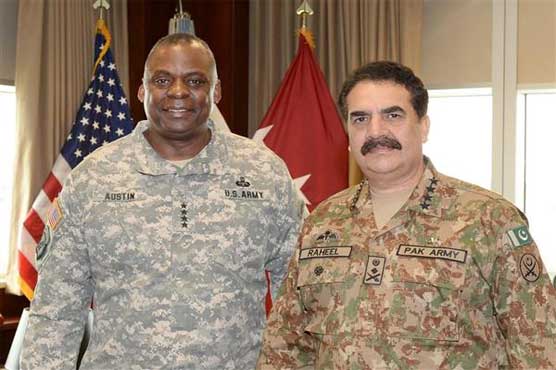US Visit: COAS acknowledged for Zarb-e-Azb operation

Issues related to boarder security and regional peace have been taken under consideration.
WASHINGTON (Dunya News) – Chief of Army Staff (COAS) General Raheel Sharif met chief of American officials at Central Command (CENTCOM) General Llyod J.Austin today (Tuesday) at CENTCOM headquarters in Florida.
According to details, Directorate General Inter-services Public Relations (DG ISPR) General Asim Bajwa wrote on Twitter that General Austin has appreciated Pakistan’s efforts in counterterrorism including the ongoing Zarb-e-Azb operation in North Waziristan.
During routine briefing, State Department spokesman Jeff Rathke stated that Pakistan and America are excersing strong relations and the visit of COAS will help to strengthen these ties further.
He further added that issues related to border security and regional peace have been taken under discussion whereas COAS will also meet with Congress leaders.
Earlier, Pakistan’s army chief is holding talks with top US generals and officials this week in the first visit to the United States by the country s powerful military commander in four years, officials said Monday.
General Raheel Sharif s trip comes against the backdrop of improved relations between the two governments with Washington encouraged by Pakistan s offensive against Islamist militants in the country s northwest.
After arriving in Washington on Sunday, Sharif held talks at US Central Command in Tampa, Florida on Monday and was scheduled to meet the US Army chief, General Ray Odierno, the chairman of the US Joint Chiefs of Staff, General Martin Dempsey and the deputy defense secretary, Robert Work, over the next two days, US officials told AFP.
It was Sharif s first trip to the United States since he took over the post in November 2013, and the first of any Pakistani army chief since 2010.
Sharif s predecessor had an often tense relationship with Washington amid accusations Islamabad was failing to take action against Haqqani extremists and other insurgents based in Pakistan that orchestrate attacks on American and NATO troops in Afghanistan.
A senior US officer in the NATO-led force in Afghanistan, Lieutenant General Joseph Anderson, told reporters this month that Pakistani military operations in North Waziristan had "fractured" the Haqqani network.
The Pakistani military campaign "has very much disrupted their efforts here and has caused them to be less effective in terms of their ability to pull off an attack here in Kabul," Anderson said by video link from Kabul.
US officials are also hopeful that a new president in Afghanistan, Ashraf Ghani, can bolster cooperation and dialogue between Kabul and Islamabad, just as NATO s US-led force withdraws from the fight against the Taliban.
Ghani traveled to Pakistan last week for talks with Prime Minister Nawaz Sharif.
Former Afghan president Hamid Karzai routinely accused Pakistan of backing the Taliban insurgency to destabilize his country as a hedge against Indian influence there.
Pakistan was one of only three countries to recognize the hardline Taliban regime that ruled Kabul from 1996 until 2001. The regime was toppled by a US-led international military coalition following the September 11 attacks by the Al-Qaeda network, which the Taliban allowed to operate out of Afghanistan.

